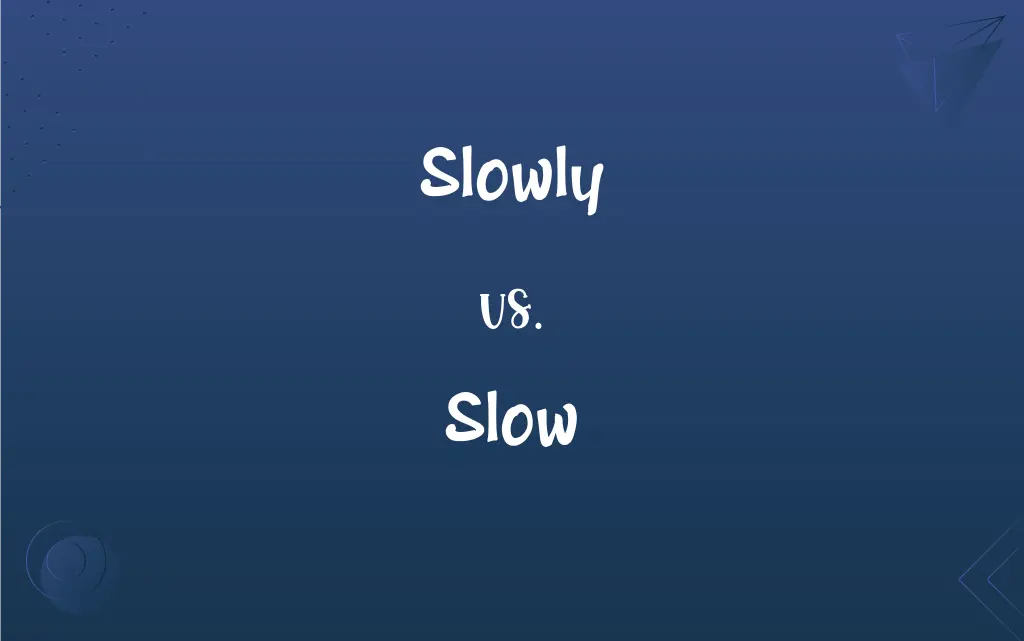Slowly vs. Slow: What's the Difference?
Edited by Janet White || By Harlon Moss || Updated on November 2, 2023
"Slowly" is an adverb describing the manner of an action. "Slow" is an adjective describing the characteristic of a noun.

Key Differences
Slowly refers to the speed at which an action is performed and is used as an adverb. It modifies verbs, adverbs, or adjectives, indicating that something happens at a leisurely or reduced pace. Slow, however, is primarily used as an adjective, providing a description of a noun or pronoun, suggesting a lack of speed or a reduced rate of movement.
When one says "He drives slowly," the adverb 'slowly' describes the manner in which 'he' is performing the action of driving. In contrast, in "He is a slow driver," the adjective 'slow' is describing the noun 'driver', giving us information about the driver's usual speed.
If we consider the sentence, "She spoke slowly to ensure understanding," 'slowly' is giving us details about how she spoke. On the flip side, "The slow speech was difficult to follow" uses 'slow' to describe the noun 'speech', commenting on its pace.
The instruction "Please read slowly" applies 'slowly' directly to the verb 'read', asking for the action of reading to be done at a slower pace. In a different context, "The slow reader took extra time to finish the book," 'slow' is characterizing the noun 'reader', telling us that the reader generally reads at a slower pace.
In writing, using 'slowly' enhances the description of actions, giving a narrative a more detailed pacing. For example, "The sun sank slowly below the horizon," provides a visual pace to the sunset. Whereas using 'slow' sets the scene or describes a characteristic, as in "The slow summer days stretched on endlessly," giving us a general sense of time passing.
ADVERTISEMENT
Comparison Chart
Part of Speech
Adverb
Adjective
Function
Modifies verbs, adverbs, or adjectives
Describes or modifies nouns
Usage in a Sentence
To indicate how an action is performed
To describe the nature or characteristic of something
Examples
"She smiled slowly."
"The computer is slow."
Position in Sentence
Typically follows the verb it modifies
Precedes the noun it describes or follows a linking verb
ADVERTISEMENT
Slowly and Slow Definitions
Slowly
Indicating a gradual progression.
Spring arrived slowly but surely.
Slow
Not quick to understand or respond.
He's slow to catch on to jokes.
Slowly
At a slow pace or speed.
The hours passed slowly.
Slow
Operating at reduced or less than desired speed.
My computer is slow today.
Slowly
With caution or reluctance.
She slowly approached the stray dog.
Slow
Taking or requiring a long time.
It was a slow process to get the results.
Slowly
With a lag or delay.
The news spread slowly across the town.
Slow
Not moving quickly; at a reduced pace.
Traffic was slow after the accident.
Slowly
With deliberate, unhurried action.
He slowly turned the key in the lock.
Slow
Not busy or active.
Business is slow during the winter months.
Slowly
Not moving or able to move quickly; proceeding at a low speed
A slow train.
Slow walkers.
Slow
Not moving or able to move quickly; proceeding at a low speed
A slow train.
Slow walkers.
Slowly
Marked by a retarded tempo
A slow waltz.
Slow
Marked by a retarded tempo
A slow waltz.
FAQs
Can I use slowly with non-action verbs?
Slowly is best used with action verbs since it describes the manner of an action.
Is slowly always related to movement?
Slowly typically describes the pace of an action, which often involves movement.
Is slow used for performance?
Yes, slow can describe the performance of a device or person, indicating reduced efficiency.
Can slow be used as an adverb?
Yes, in informal English, slow can sometimes function as an adverb, as in "Go slow."
Can slow describe personality?
Yes, slow can describe someone's nature, like being slow to anger.
Does slowly have a comparative form?
Yes, more slowly or slower can be used as the comparative form of slowly.
Can slow be used before verbs?
As an adjective, no. As an informal adverb, sometimes, as in "Drive slow."
Can the word slowly be an adjective?
No, slowly is always used as an adverb.
Can slowly describe a period of time?
Slowly can describe the perceived length of time, as in "The days went by slowly."
Does slow always imply a negative connotation?
Not always, in some contexts slow is positive, like "slow-cooked" implying careful preparation.
Can I use slow as an adverb in formal writing?
In formal writing, it's best to use slowly as the adverbial form.
Can slowly be used figuratively?
Yes, slowly can be used to describe actions or changes metaphorically.
Is it correct to say "a slow run"?
Yes, this implies the run was at a slow pace.
Can I use slow to describe music?
Yes, slow can describe the tempo of music.
Does slowly have synonyms?
Yes, words like gradually, unhurriedly, and leisurely are synonyms.
Does slow describe time?
Slow can describe the passage of time, as in "time moves slow."
Can slow modify another adjective?
No, slow is an adjective and can't modify another adjective.
Can I use slowly in a sentence without a verb?
No, slowly needs a verb to modify.
Is slowly only for physical actions?
No, it can also describe the rate of change in situations or emotional responses.
Is "move slow" grammatically correct?
It's correct in informal English, though "move slowly" is the standard adverbial form.
About Author
Written by
Harlon MossHarlon is a seasoned quality moderator and accomplished content writer for Difference Wiki. An alumnus of the prestigious University of California, he earned his degree in Computer Science. Leveraging his academic background, Harlon brings a meticulous and informed perspective to his work, ensuring content accuracy and excellence.
Edited by
Janet WhiteJanet White has been an esteemed writer and blogger for Difference Wiki. Holding a Master's degree in Science and Medical Journalism from the prestigious Boston University, she has consistently demonstrated her expertise and passion for her field. When she's not immersed in her work, Janet relishes her time exercising, delving into a good book, and cherishing moments with friends and family.































































